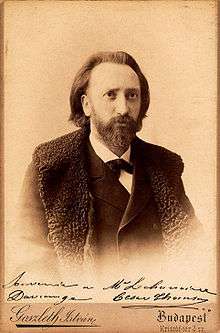César Thomson
César Thomson (18 March 1857 – 21 August 1931) was a Belgian violinist, teacher and composer.

Biography
He was born in Liège in 1857. At age seven, he entered the Liège Conservatory of Music, and studied under Désiré Heynberg, Rodolphe Massart and Jacques Dupuis (1830-1870). By age 16, he was considered to have "a technique unrivalled by any other violinist then living".[1] He was also a student of Hubert Léonard, Henryk Wieniawski and Henri Vieuxtemps.[2]
In 1873 he became concertmaster of the private orchestra (52 players) of Baron Paul von Dervies, a Russian banker and railroad magnate, who, in 1870, had built the Castello di Trevano as a temple to music, in the vicinity of Canobbio, by Lugano, Switzerland. After von Dervies lost his mind and disappeared, Thomson left Lugano in 1877, but not before he had married a local noblewoman, Luisa Riva.[3] In 1879 he played in a Berlin orchestra, and in 1882 was appointed violin professor at his alma mater, the Liège Conservatory. In 1897 he succeeded Eugène Ysaÿe as principal professor at the Brussels Conservatory. In 1898 he established a string quartet, with himself as first violin.
He had great success as a concert soloist at Leipzig in 1891 and Brussels in 1898. His appearances in Britain and the United States were less favourably received, but he was popular in South America. He taught at Ithaca College in New York 1924-27 and at the Juilliard School.[4]
César Thomson revived many of the then obscure works of Niccolò Paganini, and he did much work in editing, arranging and transcribing works from the early Italian school, by composers such as Corelli, Handel, Tartini, J. S. Bach, Nardini and Vitali.[3] His own compositions included a Zigeuner Rhapsody for violin and orchestra (1909).[5]
César Thomson died in Bissone, near Lugano, in 1931.
Honours
- 1919 : Commander of the Order of Leopold.[6]
His notable students included: Hugo Alfvén, Aylmer Buesst, Edwin Grasse, Johan Halvorsen, Paul Kochanski, Demetrius Dounis, Alma Moodie, Theo Massun, Gustave Koeckert, Guillermo Uribe Holguín, Tony Schultze, and Haydn Wood; he also played an important role in training two significant American chamber groups, having taught three members of the Flonzaley Quartet[7] and at least two of the Zoellner Quartet,[8] which made its first European appearances at his private soirees.[9]
There is a Boulevarde César Thomson in Liège.
References
- Grove’s Dictionary of Music and Musicians, 5th ed.
- Sheila M. Nelson, The Violin and Viola
- Ricercarmusica (Italian)
- Ithaca College Scrapbook
- University of Rochester
- RD of 14.11.1919
- Robin Stowell (2003). The Cambridge Companion to the String Quartet. Cambridge Companions to Music. Cambridge University Press. p. 77. ISBN 978-0-521-00042-0.
- University of California, Los Angeles library, performing arts special collections, finding aid for Zoellner Family Collection of Scrapbooks, Photographs, and Papers 1890-1990 Archived 20 December 2009 at the Wayback Machine, accessed April 2012
- Who's Who in Music and Dance in Southern California, Hollywood: Bureau of Musical Research, 1933.